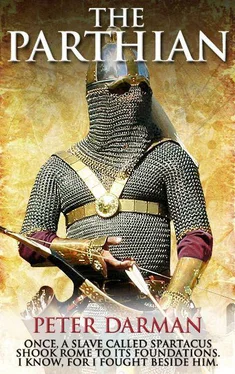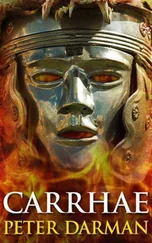Peter Darman - The Parthian
Здесь есть возможность читать онлайн «Peter Darman - The Parthian» весь текст электронной книги совершенно бесплатно (целиком полную версию без сокращений). В некоторых случаях можно слушать аудио, скачать через торрент в формате fb2 и присутствует краткое содержание. Год выпуска: 2011, Жанр: Исторические приключения, на английском языке. Описание произведения, (предисловие) а так же отзывы посетителей доступны на портале библиотеки ЛибКат.
- Название:The Parthian
- Автор:
- Жанр:
- Год:2011
- ISBN:нет данных
- Рейтинг книги:4 / 5. Голосов: 1
-
Избранное:Добавить в избранное
- Отзывы:
-
Ваша оценка:
- 80
- 1
- 2
- 3
- 4
- 5
The Parthian: краткое содержание, описание и аннотация
Предлагаем к чтению аннотацию, описание, краткое содержание или предисловие (зависит от того, что написал сам автор книги «The Parthian»). Если вы не нашли необходимую информацию о книге — напишите в комментариях, мы постараемся отыскать её.
The Parthian — читать онлайн бесплатно полную книгу (весь текст) целиком
Ниже представлен текст книги, разбитый по страницам. Система сохранения места последней прочитанной страницы, позволяет с удобством читать онлайн бесплатно книгу «The Parthian», без необходимости каждый раз заново искать на чём Вы остановились. Поставьте закладку, и сможете в любой момент перейти на страницу, на которой закончили чтение.
Интервал:
Закладка:
‘We don’t know if he,’ he jabbed a finger in my direction, ‘and his bunch of riders can fight, let alone take a town. What if messes up? The men following him will be caught in the open. I don’t trust him.’
I rose from my stool, but Spartacus waved his hand for me to remain seated. ‘I can understand your reticence, Crixus. I will therefore ride with Pacorus and his men, to make sure nothing goes awry. You will stay here with your men. Castus and his Germans will support us.’
Castus smiled, but Crixus jumped up. ‘Me and my Gauls should be the ones to burn Nola.’ Crixus’ companion nodded his agreement, though I noticed he stayed seated. Nergal looked at them both with narrowed eyes. Clearly he had formed the same impression of Crixus as I had.
Spartacus walked towards Crixus until their faces were inches apart. ‘We’re not going to burn Nola, that’s why your Gauls will stay here. We’re going to empty it of anything useful. Besides,’ he grinned at Crixus, ‘if I’m killed, you will then be the leader of the army.’
I could see that Crixus was weighing up the options in his over-sized head and he clearly liked to idea of being a general, for he sat back down and grunted. ‘Don’t say I didn’t warn you. If you’re killed I will burn Nola in any case.’
Spartacus smiled. ‘I’ve no doubt. We leave tomorrow. Castus, you and your Germans will be the foot. You will march tonight along the road that leads to Nola’s western entrance and stay hidden tomorrow. We will link up with you a few miles from Nola, and then you and your men will follow us. As soon as you get within sight of the town, you will attack through the open gates.’
‘And if the gates are not open?’ asked Castus.
‘Then head back to Vesuvius and put yourself under the command of Crixus.’
Afterwards Crixus stomped off to his section of the camp, while I talked with Castus and his lieutenant, whose name was Cannicus.
‘How many men do you have?’ I asked.
‘Around two thousand. More are coming in every day, but the majority are Gauls and they are swelling Crixus’ ranks. He was bragging that he has four thousand men. If Spartacus falls I will be leading my people out of here. I won’t serve under Crixus. Think the plan will work?’
‘It might,’ I said, ‘it just might.’
We clasped each other’s forearms. ‘Until tomorrow, then,’ he said.
‘Until tomorrow,’ I was starting to like Castus. He wasn’t a boaster and I believed he had a cool head on his shoulders.
That night Castus led his men out of the camp, hundreds of black-haired Germans marching in column and carrying shields, spears, swords and axes. Mail shirts were few, with most dressed in threadbare tunics and nothing on their feet. Those in the rear ranks carried only wooden shafts whose ends had been sharpened to a point and then held in a fire to harden the end. Spartacus was right — we needed more weapons and equipment. Spartacus had the Roman cavalry weapons and armour delivered to our camp that afternoon: mail shirts, red cloaks, open-faced helmets decorated with bronze, and oval wooden shields, each one covered with hide and having a central steel boss with a wooden grip behind it. The swords were similar to the one Spartacus had given me, though their quality was not as good, a fact commented on sarcastically by Gafarn. Finally, we would each carry an eight-foot-long lance as thick as a man’s wrist tipped with a steel head.
The next day we groomed and fed the horses after dawn had broke and kitted ourselves out in our new arms and armour. Spartacus joined us after breakfast.
‘Make sure you and your men tuck their long hair into their helmets. Roman cavalry don’t have flowing locks.’ His attention to detail was excellent.
I had selected a magnificent steel helmet that had silver cheek guards, a brass visor and a large red crest. It was clearly an officer’s helmet and its thick leather lining meant it was comfortable to wear. I insisted Spartacus wore a similar design, as he and I were going to ride at the head of the column and we had to look the part.
We left early in the morning, riding west by the side of well-maintained, stone-paved roads through lush green countryside interlaced with fields. There wasn’t a soul in sight. The slaves who had worked the fields had either joined Spartacus or fled, to where I did not know. There was an odd silence around us, as though the land itself was waiting to see what would happen. As we rode in silence, twenty red-cloaked warriors disguised as the enemy, we passed burnt-out houses set back some distance from the road, no doubt the slaves of the estate had taken their revenge on their masters before they had left.
Two hours later, on the orders of Spartacus, we halted beside a large wood that sprawled across a hillside and waited. We dismounted and led our horses into the shade of the trees and rested. Spartacus walked away into the wood and reappeared a few minutes later with Castus by his side. The two of them walked over to me and squatted beside me. Castus nodded at me and smiled. Spartacus’ face was hard and expressionless. His briefing was short and to the point.
‘Nola is five or so miles down this road. The town sits in a plain, so anything that approaches it from any direction can be seen by the guards on the walls. Castus, you and your men will follow Pacorus and I down this road. If we have succeeded you will see that the gates are open. If they are, get your men down the road and into the town as soon as possible. If the gates are closed then we’ve failed, in which case get yourself back to Vesuvius. Good luck, Castus.’
Spartacus rose and embraced Castus, then mounted his horse. I too embraced the German and vaulted onto my horse, the same chestnut mare that I had first ridden in this army. Then we rode towards Nola, two abreast, keeping off the road. We did not want to appear out of the ordinary. Roman horses were not shod, though we had fitted the horses we rode with shoes, as was the custom in Parthia. We crested a small rise and entered a wide plain dotted with fields and copses, in the centre of which stood Nola. It was encompassed on all sides by a wall, and from our slight vantage point I caught a glimpse of red roofs and white-faced buildings. We maintained an even pace as the road led us straight towards one of the town’s gatehouses. I was sweating as we rode up to the gatehouse, which comprised two square, two-storey towers with red-tiled roofs, either side of an arch that was barred by two wooden gates. Guards stood on the rampart above the gates, in front of which we halted.
As we approached the gates we slowed to a gentle trot. My mouth was dry as I viewed the gatehouse with trepidation, saw guards on the wall above the gates themselves, and windows in the two towers with closed wooden shutters, which no doubt could be opened to make effective ports from which to fire arrows. Spartacus’ plan suddenly seemed a very bad idea.
‘Stay silent,’ he snapped, ‘leave the talking to me.’
We halted about twenty paces from the gates as a soldier wearing the distinctive helmet of a centurion peered at us from atop the wall.
‘State your business.’
Spartacus, his face enclosed by his helmet and its cheek guards, raised his hand in salute.
‘Decurion Batiatus to see the garrison commander.’
‘On what business?’ replied the centurion.
‘On military business, centurion.’
The centurion placed both hands on the wall and leaned over to look at Spartacus more closely.
‘Who is your commander?’
‘The Praetor Varinius Glaber.’
‘I thought he had been killed by the gladiators.’
‘You thought wrong. He is camped twenty miles from here with two ala of horse and half a legion.’ Spartacus pulled a scroll from a saddlebag. ‘Here is his orders for the garrison commander. I am to deliver them in person.’
Читать дальшеИнтервал:
Закладка:
Похожие книги на «The Parthian»
Представляем Вашему вниманию похожие книги на «The Parthian» списком для выбора. Мы отобрали схожую по названию и смыслу литературу в надежде предоставить читателям больше вариантов отыскать новые, интересные, ещё непрочитанные произведения.
Обсуждение, отзывы о книге «The Parthian» и просто собственные мнения читателей. Оставьте ваши комментарии, напишите, что Вы думаете о произведении, его смысле или главных героях. Укажите что конкретно понравилось, а что нет, и почему Вы так считаете.












